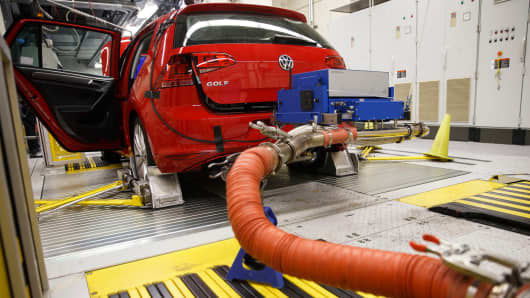
Patrick T. Fallon | Bloomberg | Getty Images
Hoses connect laboratory emission testing equipment to a red 2016 Volkswagen AG Golf TDI inside the California Air Resources Board Haagen-Smit Laboratory in El Monte, California.
European Union lawmakers have hammered out a deal to cut vehicle emissions by 35 percent by 2030, offering a further boon to the development of electric and hybrid cars.
Germany, which had insisted on a maximum 30 percent cut, relented after winning a concession to carry out an interim review of the rules. Germany's stance had been backed by other car producing nations including Bulgaria, the Czech Republic, Hungary, Poland and Slovakia.
The group of environment ministers said the 35 percent reduction of carbon dioxide gas emitted must be from recorded levels in 2020. It also should include an intermediate target of a 15 percent reduction by 2025.
Last week, the European parliament voted for a more ambitious 40 percent reduction by 2030.
Ministers from the 28 nations will meet Wednesday onward with representatives from the European Parliament to work towards translating the recommendation into law.
One global forecast on energy has predicted that almost all new sales of cars across Europe to be electric or hybrid within 20 years. The report, titled the Energy Transition Outlook, says for the United States, a similar situation will be in place by the 2040s.
Automakers in Europe have been less effusive about a rapid transition away from traditional combustion engines. In September, the European Automobile Manufacturers' Association (ACEA) said fewer workers will be required to build or repair all-electric vehicles.
"Overly stringent CO2 targets, as well as unrealistic sales quotas for battery electric vehicles, could lead to serious structural problems across the EU," ACEA said.